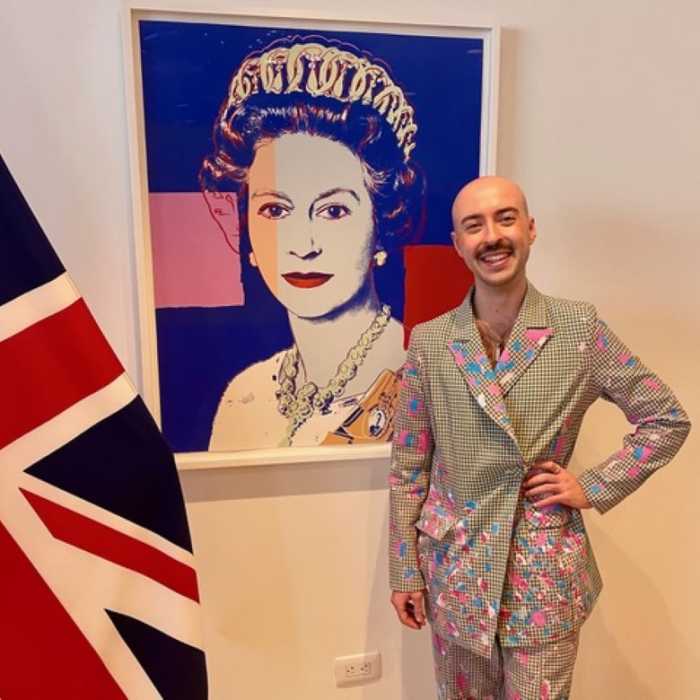Bernard Aptekar comes by his politics honestly
The 60-point four- column headline in a newspaper called Dziennik Åódzki, over a photograph of Bernard Aptekar and one of his machine gunners, reads “Sztuka wymierzona w wojne I inima wisc.”
What’s that in English, an American journalist wondered.
“I haven’t the faintest idea” said Bernard Aptekar, mildly. “My mother, who was born in Poland, didn’t speak to me in Polish — ever. She spoke English to me, and Yiddish to my grandparents.”
Which adds a certain amount of spice to the fact that he was just back from spending the whole month of September 2009 — he and his wife Bozena — as honored guests of an exhibit of the city of Åódz (pronounced “Woodge”), Poland.
Everything about Mercer Street’s 73 year-old Bernard Aptekar seems mild and quiet—everything except his art. His flamboyant, stylized sculptural paintings, or painterly sculptures, are Hieronymus Bosch reborn as a Nightmare Comix running commentary on man’s inhumanity to man (not to mention women and children) in work as loud as his voice, Aptekar’s, is low.
As loud and large. With titles to suit: “Aliens at the Intergalactic Café,” “The Defeat of the City of Plutonium,” “Our Men and Some of Their Work.” One layout, “Merrily We Roll Along,” was altogether too huge to fit into the classic-columned 85 year-old Miejska Galeria Sztuki, Åódz. At one end of “Merrily We Roll Along,” a newborn babe is clawing its way back into its mother’s womb; at the back other end helmeted Dick Cheney is cradling a machine gun at the prow of a war canoe.
So how, Bernard, did all this come to pass — this homage to a Jewish artist in a town in a land now notably healthy for Jews?
“I don’t know,” says Aptekar. Poland on the one hand is full or virulent anti-Semitism, but on the other, lots of ordinary Poles are sympathetic toward Jews.
Ordinary Poles like those in Claude Lanzmann’s great 9 1/2 hour documentary “Shoah” — good simple rural Poles who feel murderous toward any Jews returning to reclaim their houses after the Holocaust?
“That’s true,” says artist Aptekar. “I know some people who got shot at when they went back to their villages after the war.”
All he knows is that two years ago a Polish actress named Malgorzata Potocka came to look “at his stuff in the loft,” just below NYU where he has lived and worked since 1973.
“I think maybe her son knew about me,” says the Aptekar who is also a professor of art at City Tech (New York City College of Technology). “In any event, she looked and looked and then said: ‘We should have a show of this in Poland.’ I said, “All right, I’ll do it if you can find a place to do it.”
The place she found was this Galleria in a park in the center of the town of Lodz. The curator of the show and administrator of the gallery is Elizabeth Fuchs, who might herself be Jewish.
“I think so,” says Aptekar, quietly. If he doesn’t speak Polish, does he speak Yiddish?
“I used to, but then I had a stroke that took away my use of languages.”
For what it’s worth — possibly zero — while Aptekar and his Polish-born, Catholic-born wife were in town, there was a commemorative ceremony honoring the WW II Jewish ghetto of Åódź. It was held outdoors by the old Jewish cemetery. The mayor spoke. An orchestra played Penderecki’s “Seven Gates of Jerusalem.” Five rabbis gave the benediction.
In great ironic contrast with the Åódz embrace of Aptekar’s work is the crass rejection five years ago of a large Aptekar installation in the lobby of the new Conde Naste building at 4 Times Square, New York City. As the truck drove up carrying the prearranged exhibit, the installation was cut short by a gaggle of officious men and women in suits. They looked, they huddled, and they ruled: No Aptekar here today, thank you.
They turned out to be legal eagles from the firm of Skadden Arps Slate Meaghe, the new structure’s prime tenants.
Looking back on it at this remove, Aptekar merely murmurs: “I guess they didn’t like it.” One recognizable face in the display had been that of Martin Luther King, Jr. “I guess they didn’t like that.”
What particularly impressed Aptekar was how “engaged” the Polish general public was in his work. “They asked questions that were thoughtful, serious and pointed. In Poland, not here.”
Thoughtful, serious and pointed — these are good words to describe the household in which Bernard Aptekar grew up. It was a union household, a working man’s household, a radical household. If Polish had been Fannie Aptekar’s first language, Al Aptekar’s had been the Russian of the Ukraine.
Here in America he became a union organizer for the projectionists in a movie house, and argued politics with his friend (but not a relative), the noted writer and sociologist Herbert Aptekar.
“After the war,” says his son, my father became a Communist Party (CPUSA) treasurer. People like (far leftists) Herbert Biberman, Paul Jarrico, Alva Bessie, were always around the house. My father collected money from those such as Humphrey Bogart. It was an interesting way to grow up.”
So you come by your politics honestly…
“That’s right. Yes, I do,” said Bernard Aptekar, as agreeable as one might order a soft-boiled egg when the shells are bursting and the monsters growling all around him.

































